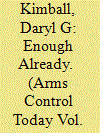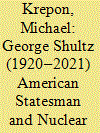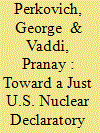| Srl | Item |
| 1 |
ID:
180421


|
|
|
|
|
| Summary/Abstract |
“When you vote [against missile defense] as a member of Congress, you are telling your own 575,000 constituents in your district that you are going along with an agreement that leaves them exposed deliberately to missile attack," according to U.S. Representative Duncan L. Hunter (R-Calif.).1 Hunter, a strong proponent of missile defense, put his finger on a challenge that missile defense skeptics in Congress have faced for years: it is difficult to vote against “defense.”
|
|
|
|
|
|
|
|
|
|
|
|
|
|
|
|
| 2 |
ID:
180419


|
|
|
|
|
| Summary/Abstract |
President Joe Biden entered office with a deep knowledge of the dangers of nuclear weapons and the arms race. During the campaign, he said the United States “does not need new nuclear weapons” and “will work to maintain a strong, credible deterrent while reducing our reliance and excessive expenditure on nuclear weapons.
|
|
|
|
|
|
|
|
|
|
|
|
|
|
|
|
| 3 |
ID:
180422


|
|
|
| 4 |
ID:
180420


|
|
|
|
|
| Summary/Abstract |
When adversaries consider each other’s capabilities and intentions, they focus on whichever is most threatening. With nuclear weapons, force posture and operational practices are usually considered more important than what leaders declare are circumstances in which they would consider unleashing nuclear weapons. Still, nuclear policies and forces require rationales to guide them. Declaratory policy articulates such rationales, even if decision-making on the development of nuclear weapons and other capabilities sometimes has a bureaucratic-political-economic logic of its own.
|
|
|
|
|
|
|
|
|
|
|
|
|
|
|
|